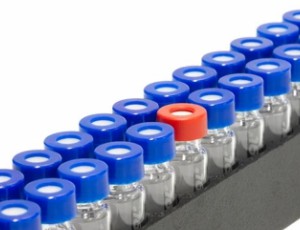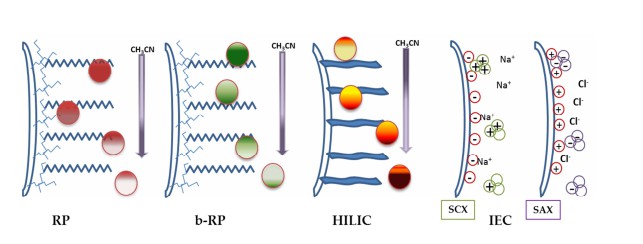
- Home
- PTMs Proteomics
- Peptide Enrichment for MS-Based Analysis
- Reverse Phase Liquid Chromatography (RPLC)

Due to the simple solvent systems, reversed-phase liquid chromatography (RPLC) is particularly compatible with mass spectrometers and has been widely used in peptide analysis. To meet the diverse protein PTM analysis needs of our customers, Creative Proteomics offers a range of modified peptide enrichment strategies for our customers to choose from, including one of the commonly used high-performance liquid chromatography (HPLC) techniques, RPLC. We are committed to using state-of-the-art instrumentation and our experience to select the best separation conditions and provide optimized and customized workflows for our customers' specific sample situations.
RPLC, also known as reverse phase chromatography (RPC), is based on hydrophobic interactions of the protein/peptides with the RPC stationary phase for protein/peptide separation and enrichment. Due to its powerful resolving capability, recovery, and reproducibility, RPLC is currently the most widely used method for the purification and analysis of peptides. Compared to ion exchange chromatography (IEX) and hydrophobic interaction chromatography, which can achieve purification factors in the range of 2 to 40 and 2 to 30, RPLC can achieve a wide range of purification factors from 2 to 200. In addition to the efficient resolution capability, the RPLC does not require sample desalting due to the use of a volatile mobile phase, thus reducing sample damage to a minimum, which is another major advantage of this technique. At present, RPLC is the most prevalent separation technique in top-down proteomics.
 Fig. 1 The most common stationary phase interactions in Liquid Chromatography for peptide separation used as first dimension in Proteomics. (Izumi, Victoria, 2018)
Fig. 1 The most common stationary phase interactions in Liquid Chromatography for peptide separation used as first dimension in Proteomics. (Izumi, Victoria, 2018)
At Creative Proteomics, we commonly combine RPLC with other peptide enrichment techniques to achieve superior PTM analysis. The services offered include, but are not limited to, the following list:
Creative Proteomics specializes in peptide separation enrichment for MS-based PTM analysis and provides a broad range of services, including phosphopeptide enrichment service, acetylated peptide enrichment service, ubiquitinated peptide enrichment service, glycopeptide enrichment service, histone isolation and enrichment service. For more information on our modified enrichment services and sample requirements, please feel free to contact us. It is important to note that our customer service representatives are available 24 hours a day, Monday through Sunday.
References
Our products and services are for research use only.